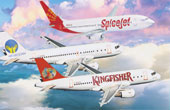 |
| Mouthful of sky: Travellers can take their pick from the low budget options on offer these days |
For some travellers last week, a flight from Mumbai to Delhi would have cost less than their taxi rides home. Passengers now have the option to choose between discounted fares of the full-service carriers such as the state-owned Indian Airlines and the private Jet Airways or Air Sahara, the low-budget airlines such as Air Deccan and Spicejet or the new Kingfisher Airlines.
Passengers who book early enough have long been able to make substantial savings through advance purchase (Apex) schemes of the full-service carriers. But the low-budget carriers and new airlines offer other options too. Air Deccan offers some seats on its flights between metros for just Re 1 and Rs 500 with an extra Rs 221 as tax.
Early reservations would fetch a Delhi-Mumbai fare of Rs 1,699, or a Mumbai-Goa fare of Rs 899 on Spicejet, the newest low-budget carrier.
Kingfisher Airlines with a single cabin class describes itself as a full-service carrier that provides a video screen for every seat with five video channels and take-home headsets. These features are not available on any other domestic airline, says Girish Shah, marketing, Kingfisher Airlines. The Mumbai-Bangalore fare aboard a Kingfisher Airlines flight begins at Rs 2,999 and ends at Rs 3,499.
Aviation analysts say that consumers ? taking advantage of the cut-throat competition between airlines ? are reaping the benefits of low air fares and differential pricing. But they also need to be adequately informed about the options they have and the restrictions that come with discounted air fares.
“We need customer information charters that specify the rights, privileges and restrictions on passengers,” says Kapil Kaul, chief executive officer at the New Delhi office of the Centre for Asia-Pacific Aviation.
For airlines, the priority is selling their seats. “A seat on any commercial flight is a perishable commodity,” says a senior officer of a domestic airline. A seat has to be sold before the flight takes off. A vacant seat on a flight can never be sold again.
In an attempt to maximise the number of seats taken up, airlines have resorted to differential pricing that involves dividing seats in an aircraft into several classes and selling them at different prices. The fares may begin at rock bottom figures and steadily rise as the seats get taken.
Under this pricing strategy, the passengers who book the first seats pay only a fraction of what the passengers who book the last seats on a flight will pay.
For instance, the first one or two seats aboard Air Deccan’s 180-seater Airbus plying between the metros are sold for Re 1.
With an additional Rs 221 as taxes, these passengers can fly for just Rs 222. The next five or six seats are sold at Rs 500, which means passengers pay just Rs 721 as the total fare. The next set of seats cost Rs 1,100 and so on.
“Our fare on the last day is still far below the regular fare on a full-service carrier,” says John Kuruvilla, chief revenue officer with Air Deccan. The low-budget airlines operate on a model where they seek to make direct sales of tickets to customers through the Internet or other non-traditional channels rather than through travel agents. Last week, Air Deccan began selling its tickets through select petrol stations in New Delhi.
Differential pricing allows an airline to increase the total revenue per flight with little impact on the total operating costs. And it can attract passengers who would otherwise have not flown at all. “The Indian consumer is already used to the concept of booking well in advance,” says Kuruvilla. Rail travellers have long had to book their tickets many weeks, sometimes up to 60 days, in advance.
For consumers, there are two key rules: book as early as possible and don’t change dates once the booking has been done.
Airlines, however, differentiate fare products by applying restrictions on the cancellations or changes made on the lower-priced tickets. In the case of seats booked under Apex fares, changes usually attract a penalty that may range from Rs 250 to half the basic fare. One airline charges Rs 500 per person per sector on any change in the ticket.
A full-service carrier whose flight has been delayed or cancelled may be able to transfer a passenger onto another full-service carrier that has a comparable fare structure. “But a low-budget airline would be unable to move its passengers onto a full-service carrier because of the big difference in fares,” says Kaul.
Would the passengers be entitled to a phone call or a meal? “It’s important for airlines to make information about such restrictions available to consumers,” he emphasises.
the downside
Here are some examples on restrictions associated with low air fares as cited by the call-centre executives of the respective airlines:
 |
• Air Deccan: A rescheduling charge of Rs 200 per ticket. Passengers have to pay the fare difference for the new date of travel. A 90 per cent refund on fare is available for cancellation 72 hours prior to departure.
• Kingfisher: A charge of Rs 200 per passenger per trip for any change in schedule or cancellation. In the event of cancellation, the passenger receives a credit note that can be used for another flight within the next 13 months.
• Jet Airways: A change in the Apex fare ticket would attract a penalty that can range from Rs 250 to half the basic price of the ticket.
• Spicejet: A charge of Rs 500 per passenger per sector is levied on any change.










